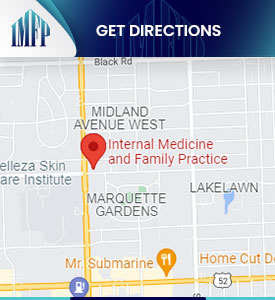When Should You Go to Urgent Care vs ER in Joliet IL
At Internal Medicine and Family Practice Dr. Wael Mctabi, MD, offers quality, affordable and convenient urgent care when you need it. Walk-In today for the treatment you can trust. For more information, contact us or schedule an appointment online. We are conveniently located at 1719 Glenwood Ave Joliet, IL 604.


Table of Contents:
Is Urgent Care Quicker than the Emergency Room?
What is the distinction between urgent and emergency care?
When should I go to urgent care instead of the emergency room?
What are the advantages of going to an urgent care clinic instead of an emergency room?
In the current world of medicine, there exists a plethora of different medical facilities, from hospital complexes to standalone clinics. With the abundance of options, it can be difficult to know where to go and when. Since urgent care clinics have been around, a lot of confusion has sprung up as to when these facilities should be utilized. In simplest terms, urgent care clinics are designed to handle urgent yet non-life-threatening injuries and illnesses, whereas hospital emergency rooms are designed to handle the most severe medical emergencies.
Urgent care is usually faster than the ER. This is because urgent care clinics handle medical situations of less severity and can therefore treat patients quicker. One reason why hospital ERs have longer waiting times is that they are handling situations that are not considered medical emergencies, which greatly increases patient wait times as this causes hospitals to work at maximum capacity or even overcapacity.
Urgent care and emergency care differ in the following ways:
The severity of Health Problems Treated — An emergency room treats life- or limb-threatening health situations in patients of all ages and is the best option when an injury, illness or condition requires immediate medical attention. Urgent care is the perfect place to go for minor illnesses or injuries that cannot wait until tomorrow, hence the name ‘urgent’. It is also a good option for illnesses or injuries that are not present with other symptoms. For example, an earache can easily be treated at an urgent care center, but if it is accompanied by a high fever (104º F or higher), it could be indicative of a more serious concern and should be evaluated at emergency care.
Hours and Staff — Emergency departments are open 24/7 and are staffed with physicians, specialists, and nurses of all backgrounds. These departments have quick access to expert providers in advanced specialties and also have the most advanced imaging and laboratory resources needed to diagnose and deliver care for severe and life-threatening situations. Although some urgent care clinics have physicians on staff, they typically have physician assistants, nurse practitioners, and nurses on site. To help them provide diagnoses and develop treatment plans, urgent care centers can order basic labs and imaging tests, such as X-rays. Urgent care clinics have set hours and, while they are not open 24/7 like the ER, they are usually open during evenings and weekends, when doctors’ offices are typically closed.
Internal Medicine and Family Practice and other urgent care centers are perfect for most non-emergency situations. They are also ideal if something happens outside of normal hours of the doctor’s office. Urgent care centers can treat:
● Minor fractures
● Back pain
● Nausea, vomiting, and diarrhea
● Minor headaches
● Bumps, cuts, and scrapes
● Fever (infants with a fever should be treated at the ER)
● Ear or sinus pain
● Cough or sore throat
● Animal bites
● Stitches
● Sprains and strains
● Mild asthma
● Foreign objects in the eyes or nose
● Allergies
● Rashes and minor burns
● Burning with urination
● Eye irritation, swelling, or pain
● Minor allergic reactions
● Cold or flu symptoms
The following conditions may indicate a medical emergency and should always be treated at an ER:
● Chest pain
● Difficulty breathing
● Stroke
● Head trauma
● Severe bleeding
● Loss of vision
● High fever (over 104º F)
Urgent care clinics offer a number of benefits over a visit to the ER, such as:
● Shorter wait times
● Walk-in appointments
● Much more affordable care
● Are in convenient, nearby locations
● Most urgent care centers take insurance
If you are looking for a quality urgent care clinic you can trust, come to Internal Medicine and Family Practice in Joliet IL. Our kind and compassionate professionals are experienced in treating a wide range of illnesses and injuries and can help you on the road to recovery! Reach out today for more information or book an appointment online. Let us walk with you as you navigate your healthcare journey. We are conveniently located at 1719 Glenwood Ave Joliet, IL 60435. We serve patients from Joliet IL, Plainfield IL, Lockport IL, Channahon IL, Romeoville IL, Manhattan IL and surrounding areas.
Check Out Our 5 Star Reviews








